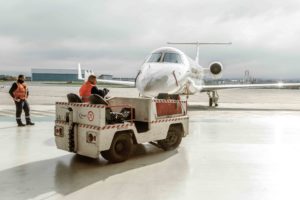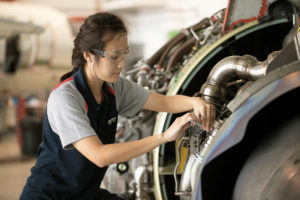David Paddock, president of Jet Aviation, discusses Covid-19, how a company’s core values should be represented and future expansion opportunities.
Jet Aviation is one of the original names in business aviation. The company, which was founded in Switzerland more than 50 years ago, has developed and diversified significantly over the decades.
The company runs 31 FBOs throughout the world. It also offers aircraft charter, management, sales, completions and MRO services and works in defence. It employs 4,000 people throughout the world at 49 locations.
A recent rebranding emphasizes the company’s pedigree and heritage. Its staff are presented as “artisans of aviation” that produce flight as art in a seamless, simple and smooth way for discerning clients. It’s effective marketing and not entirely hollow. The company has weathered the Covid-19 pandemic well, sticking to a steady expansion strategy that is set to continue.

Extending the marketing metaphor, David Paddock would be “head artisan” at Jet Aviation in more ways than one. As one would expect he knows the business inside out. An upbeat and straight-forward person, the high level of individual effort he has invested into the business is apparent when talking to him.
After a slow courtship into Jet Aviation via consulting work, Paddock joined the company full time in 2007, first working in business development and strategic planning, then taking responsibility for operations in the USA. He became president in July 2019. He increased his knowledge of the diverse business as it doubled in size during that time. “I’ve been fortunate to know a lot of the people that founded the company and to be here as it has evolved through private equity and General Dynamics-ownership.
“This business has changed a lot and the industry has changed too,” he says.
Being one of the longest-established brands in business aviation influences operations as well as shapes marketing. “What we do always comes back to focusing on high standards and a commitment to customers,” says Paddock. “We’ve forged some excellent relationships with industry peers, customers, even competitors over the years. We’ve also brought that commitment to customer service to the next level.
“We are a complex business, operating in every region of the world and in every line of business. We try to deploy our advantages for our customers.”
FBOs are one of Jet Aviation’s primary lines of business. Originally its FBOs were concentrated in Europe and the Middle East with two locations in Asia. The company became one of the first truly global players in business aviation in the 1980s with the acquisition of several locations in the USA.
Recent expansion has also been focused on the USA. A FBO and hangar facility in Scottsdale recently became operational and the company acquired a facility in Bozeman, Montana last year. It has also expanded facilities with
sister-company Gulfstream in Palm Beach, Florida and opened a new FBO at Van Nuys in California.
However, all investments are carefully made. Paddock uses a baseball analogy – hitting lots of singles to build a score instead of a going for the grand slam – to describe the strategy. He expects the company to expand elsewhere in the coming years, particularly in Europe: “Our strategic expansion has concentrated in the USA, because it has the largest fleet. All of those expansions have been made to address underserved markets.
“Underserved markets also exist in Europe and Asia Pacific. The acquisition of the Hawker Pacific business in 2018 brought us another 14 locations in Asia Pacific and enabled us to both consolidate and expand into new markets, such as Sydney and Brisbane in Australia, New Zealand and Malaysia.
“Expansion in the USA and elsewhere will be done in a strategic and measured way.”
Management
With greater size comes a greater management challenge. The company splits itself into three main regions: USA, Asia Pacific and EMEA, with regional heads for each. The approach is to drive accountability to the staff who are on the ramp, in the hangars and in the FBOs. “We try and empower the people who are closest to the task and the customer, so that they make the right decisions. By focusing on what is happening on the ramp, in the FBO lobby and in the hangar, wherever there is a customer interaction, we can thrive in a complex world,” says Paddock.
The company has also invested in the latest systems and processes to achieve a consistent service offering. It has rolled out the FBO One as a point-of-sale system across its network of FBOs, giving management visibility across all 30. Paddock himself prefers a hands-on approach to management, but Covid-19 has precluded him from visiting sites and witnessing aspects of the day-to-day business.

“When I ran the US operation I would visit every site three times a year and before the pandemic, my aim was to get to every site in the world at least once a year.
“Our communications team does a great job and we do town halls quarterly. But getting to the sites and spending time with employees and customers is the most effective way to communicate and learn what is going on in the field. It’s the best way to find out what we are doing well and where we need to improve.”
Paddock sees FBOs as providing not just a great experience for the passenger, but also for the crew. Meeting each group of people’s specific requirements is key to a successful FBO.
“Aircraft owners want to go through the FBO as quickly and seamlessly as possible, in less than a minute sometimes. The pilots and cabin crew are going to spend more time in the FBOs. In each FBO we address those requirements, in parallel to the back of house operations – customer service, line operations, making sure they are well-equipped and trained.
“Appearance is important – uniforms need to be presentable and the facilities have to look and feel clean and new. Branding is so important here and extends through the FBO and how customers can have an effortless experience.
“We are facilitators and we are problem solvers. We want to be one step ahead of the customer so if something happens, we can adjust and adapt so that their experience still appears effortless, even though there may be a lot of complexity in the background. You need to be able to be highly adaptable.”
Another important aspect of FBOs and workplace culture that Paddock stresses is safety. He believes the industry as a whole has improved its approach to safety during his career, led by initiatives like IS-BAH. The company promotes a culture of continuous improvement and has an aim of zero accidents and zero injuries.
“It’s challenging to achieve but sets people’s mindset to the task of reducing risk on behalf of our customers, our employees and their families. Our safety performance trend improves every year,” he says.
Covid-19

Like all business aviation companies, the major challenge to Jet Aviation’s operations during the past year has been the Covid-19 pandemic. The spread of the virus impacted the company’s FBO operations as early as December 2020 in Hong Kong and by March had affected its European operations. Immediate steps to enhance health and safety were taken to safeguard employees and customers. Then during April and May operations were reduced in response to market conditions.
Paddock is optimistic but realistic about a future operating with the virus. “I’m proud of the way we have managed Covid-19. Having so many locations has made it significantly more challenging,” he says.
He sees Jet Aviation’s leadership position in the sector as manifest in the way that people have addressed questions about safe operations to it during the pandemic: “All through the different lines of our business, our customers are asking questions about equipment and standards, what we are doing to keep people safe in FBOs,” Paddock says.
“The pandemic fundamentally changed how the industry approaches health and safety,” he adds. “It’s also made us focus on how technology can change the business through things like working from home and hygiene systems on the aircraft and in the facilities.”
Jet Aviation FBOs are continuing to build on the initial health and safety steps taken by introducing the latest technologies and procedures, such as ultraviolet cleaning and temperature measurement systems to help make flying as safe as possible.
Diversity in the company’s businesses has also provided resilience during the pandemic – work in MRO hangars has helped to balance out flight volumes dropping at FBOs. “At our Basel site we have 1,100 people. Its hangars have been full for the last year, because we have a book of business for aircraft completions and maintenance. That blunts the impact of the FBO business declining.”
Similarly, Hawker Pacific, which mostly maintains aircraft for defense customers in Asia Pacific, has seen an increase in work as military forces have assisted with Covid-19 operations. “In diversity there is strength,” says Paddock.
“We are coming out a lot stronger. In May last year we formed a post-Covid group to consider what our industry will look like after the pandemic,” he says.
“The news media focuses a lot on the negatives of Covid-19. But from an industry perspective there are positives. Vaccination rates are going up and infection rates are going down across all of our core markets. Volumes have been lower, but our customers have been able to fly.
“We’ve had to adapt to the new environment – and that creates opportunities we can capitalize on moving forward.”
As business aviation returns to pre-pandemic levels of activity, much has been made by industry insiders of the prospect of attracting new customers from commercial aviation to a safer, cleaner, less risky private aviation alternative. However, Paddock says it is too simplistic to say commercial aviation’s loss will be business aviation’s gain. “Business aviation will emerge stronger from the Covid-19 pandemic. It will have to adjust to a shift in travel patterns, but there are opportunities,” he says.
Sustainable future

Longer term, Paddock believes that growth for aviation is only possible if the sector’s impact on the environment is reduced. Paddock has been personally involved through his role as Chairman of GAMA in increasing awareness of sustainable aviation fuel (SAF) within business aviation. Jet Aviation was also amongst the first in the sector to offer SAF, in 2019 from its Van Nuys FBO.
“We needed to offer supply to create demand, we were early-market makers for this,” he says. “Early last year in Zurich we were the first European provider to offer SAF at a business aviation event. We’re looking at additional ways to offer SAF in Amsterdam.
“Our role in the supply chain is to put product in the places where our customers will consume and create awareness around SAF. We’re in a leadership position on this and that’s where we want to stay.”
The modern-day Jet Aviation may be very different to the maintenance company that was founded in Switzerland in 1967, but in many ways it represents the changes the industry has been through, as well as the best it has to offer. The company has preserved its values, and as expected of artisans, these shape its professional actions. The business takes itself seriously, still puts its customers first and is taking a lead in dealing with today’s challenges, while building for the future in a responsible and sustainable way.






